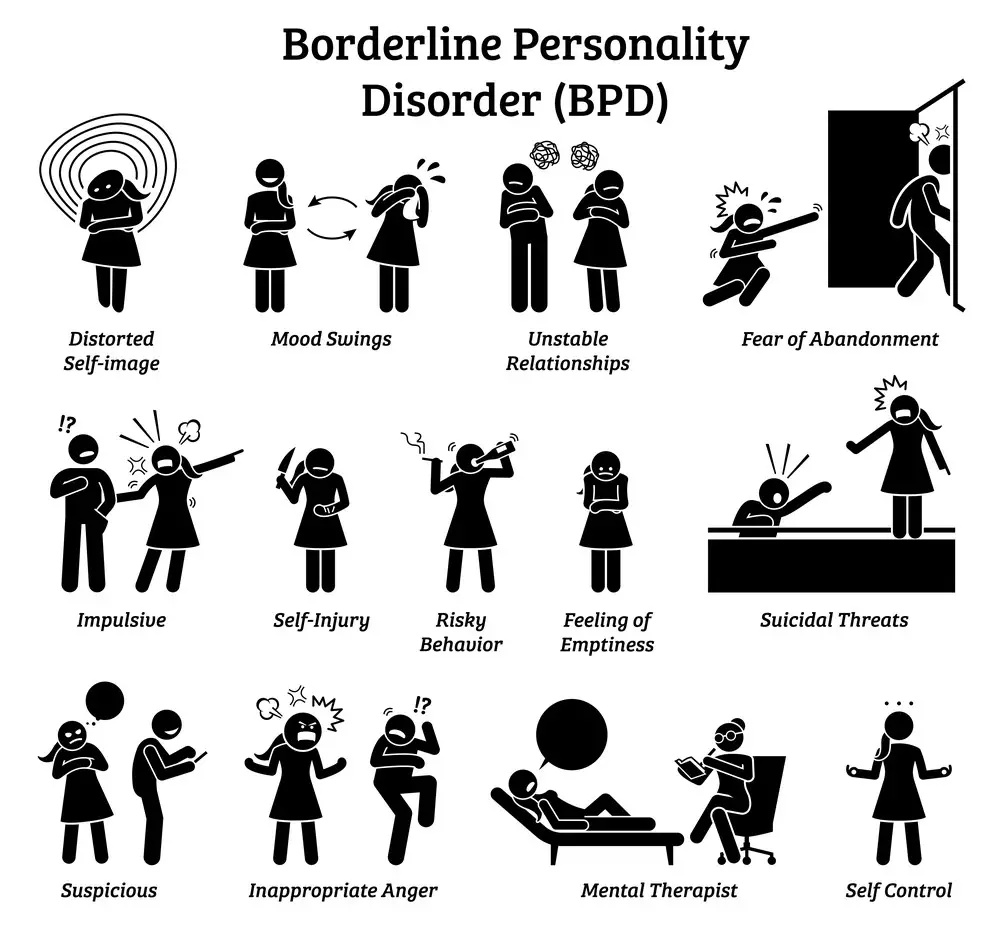Realizing that your adult son harbors negative feelings towards you can be quite unsettling for any parent. The complex dynamics of the parent-child relationship can sometimes lead to misunderstandings, resentment, and even hatred. In this article, we delve into the various aspects of this seemingly difficult situation, aiming to provide clarity and support to parents and their adult children who want to navigate the turbulent waters of their relationship.
Throughout life, relationships go through ebbs and flows. Recognizing and understanding the conflict is a crucial first step when it comes to a rift between an adult child and their parent. Emotional implications are intertwined with these conflicts, further complicating matters. This article offers a comprehensive insight into addressing mental health and establishing healthy boundaries by exploring the behaviors and symptoms that often accompany these tense relationships.
Key Takeaways
- Understand and acknowledge the root of the conflict between you and your adult son.
- Explore techniques for improving communication and developing healthy boundaries.
- Consider seeking external help to repair the relationship and cope with the situation.
 Understanding the Conflict
Understanding the Conflict
Different Perspectives
It is common for conflicts between parents and their adult children to arise due to different perspectives. Each individual may have their interpretation of events or situations, leading to misunderstandings or miscommunications. Their upbringing, culture, and personal experiences can influence these differing viewpoints. The parent and adult child must acknowledge and respect each other’s perspectives to resolve conflicts effectively.
Root Causes
Sometimes, an adult child’s animosity towards their parent can be rooted in unresolved childhood issues or traumas. This could include feelings of abandonment, neglect, or emotional abuse. A lack of parental support or guidance during crucial stages of emotional development may also contribute to these negative emotions. It is crucial for parents to identify and address any root causes to foster a healthy relationship with their grown son or daughter.
Adult Child Independence
As an adult, a child will naturally seek independence and autonomy from their parents. This can be challenging for both the parent and the adult child, as a new dynamic needs to be established. A parent must learn to let go and accept their child’s newfound independence, while the adult child must navigate the complexities of their relationship with their parent. Struggling with these changes can lead to tension and conflict within the parent-adult-child relationship. Both parties must communicate openly, establish boundaries, and respect each other’s autonomy to maintain a harmonious relationship.
Emotional Implications
Negative Feelings
Experiencing negative feelings is common when an adult child shows hate towards their parent. The parent may feel hurt, sad, and rejected. These emotions can lead to self-doubt and questioning one’s parenting abilities. The parent must acknowledge and seek support to cope with these negative feelings.
Guilt and Shame
Guilt and shame can arise when a parent feels responsible for their adult child’s negative emotions. The parent may feel that they have failed in raising their child or made mistakes that have led to the current situation. However, it’s essential to understand that it is normal for parents to make mistakes, and adults are responsible for their actions and emotions.
Frustration and Anxiety
Dealing with the adult child’s hostility can lead to frustration and anxiety for the parent. They may feel overwhelmed by the lack of control over the situation and uncertain how to improve their relationship. Seeking professional help or joining support groups can provide a safe space for discussing and addressing these feelings.
 Behaviors and Symptoms
Behaviors and Symptoms
Disrespect and Manipulation
Disrespectful behavior can manifest in several ways, such as verbal aggression, ignoring, or belittling. Children might test their parent’s authority to assert their independence. Manipulation often follows disrespect; the child might use guilt or emotionally charged language to sway the parent’s decisions.
Self-esteem and Self-harm
Low self-esteem is often linked to self-harming behaviors in adults and children alike. Parents should watch for signs of diminished confidence and withdrawal from social interactions. Self-harm could include physical injury, such as cutting or engaging in risky activities. Parents need to provide support and address these issues with care.
Lying and Neglection
Lying, even if infrequent or innocent, can indicate underlying issues. This lack of transparency can strain the parent-child relationship. Neglect might be intentional on the part of the child who wishes to distance themselves from the parent as a form of rebellion. Parents must recognize these patterns and address them before they escalate.
Addressing Mental Health
Identifying Mental Illness
Mental illness can manifest in various forms, and it may impact individuals differently. Recognizing the signs and symptoms is crucial to address the situation appropriately. Common symptoms include persistent sadness, anxiety, irritability, loss of interest in activities, and changes in sleeping and eating habits. If you suspect your adult son is experiencing mental health issues, providing support and encouraging him to seek professional help is essential.
 Understanding Borderline Personality Disorder
Understanding Borderline Personality Disorder
Borderline Personality Disorder (BPD) is one possible mental health issue contributing to family conflicts. Key characteristics of BPD include intense mood swings, unstable self-image, difficulties in relationships, and self-destructive behavior. Individuals with BPD may sometimes fear abandonment, leading to outbursts and strained relationships. Addressing this mental health issue and providing appropriate support for your adult son if he displays symptoms of BPD is vital.
Addressing Mental Health Issues
If you believe your adult son is struggling with mental health issues, addressing his emotional needs and providing support is important. Here are some steps to help:
- Listen with empathy: Encourage open conversations where your son can express his feelings without fear of judgment.
- Seek professional help: Encourage your son to see a mental health professional, such as a psychiatrist or therapist, who can provide appropriate guidance and treatment.
- Educate yourself: Learn more about mental illnesses, their symptoms, and potential treatments to understand your son’s challenges.
- Be patient: Recovery from mental health issues can take time and involve setbacks. It’s crucial to offer support and understanding throughout the process.
It’s also worth noting that addressing mental health issues can help reduce the risk of suicide, a devastating outcome associated with untreated mental illness. You can work together toward healing and a healthier relationship by supporting your adult son in recognizing and addressing his mental health struggles.
Developing Healthy Boundaries
Determining Boundaries
Establishing healthy boundaries is essential in any relationship between parents and their adult children. To determine appropriate boundaries, consider both parties’ individual needs and preferences. Start by having open and honest conversations about expectations, personal space, and the level of involvement each person desires. Remember that boundaries should be flexible and may require adjustments over time to maintain a healthy relationship.

Addressing Disrespect
Disrespect can manifest in various ways, such as ignoring requests, making critical comments, or engaging in manipulative behavior. When faced with disrespect, remain calm but assertive in communicating your concerns. Express your feelings using “I” statements, such as “I feel hurt when you speak to me in that manner.” Establish clear, realistic expectations for respectful communication and behavior, and encourage your adult child to take responsibility for their actions.
Abuse
Whether verbal, emotional, or physical, abuse is not tolerated in any relationship. Recognizing and addressing abusive behavior promptly is crucial for both parties well-being. If you feel unsafe or believe an abusive situation has escalated beyond your control, seek professional help or contact a crisis hotline. Establishing and reinforcing boundaries can help prevent further abuse, but remember that your safety should be the top priority.
Communication Strategies
Assertive Conversation
When communicating with an adult child who expresses hatred towards their parent, it is essential to practice assertive conversation techniques. This involves expressing thoughts, feelings and needs without aggression or passivity. Remember that it is crucial to maintain a neutral and calm tone of voice. Here are some tips for an assertive conversation:
- Use “I” statements to express feelings and emotions
- Be specific about unwanted behaviors without blaming or attacking
- State clear expectations and possible consequences for continued issues
- Listen actively and validate the other person’s perspective
Recognizing and Responding to Manipulation
Manipulation can sometimes be present in relationships with adult children who express hatred towards their parents. Identifying and responding to manipulative behaviors is essential for healthy communication. Here are some signs of manipulation and suggestions for responding:
Signs of manipulation:
- Shifting blame and responsibility to the parent instead of taking ownership
- Using guilt to control the parent’s actions or emotions
- Playing the victim and avoiding accountability
- Displaying passive-aggressive behaviors
Responding to manipulation:
- Be aware of your emotional triggers and maintain control of your reactions
- Communicate your boundaries clearly and consistently
- Remember your needs and values; prioritize self-care
- Seek professional support if needed, such as therapy or counseling
Remember that any attempt to improve communication with an adult child who expresses hatred should also consider their perspective and emotional needs.

Seeking External Help
Role of a Coach
A coach can be a valuable resource when dealing with the painful reality of an estranged adult child. They can help identify areas of improvement and provide guidance on rebuilding relationships. With a neutral perspective, coaches foster open communication between estranged parents and their adult child, promoting understanding and healing.
A professional coach works with parents to set realistic goals and create action plans to achieve them. They offer tools and techniques to overcome obstacles in the relationship, build trust, and establish a healthy foundation for future communication.
Group Support for Estranged Parents
Estranged parents can benefit immensely from joining support groups. In these environments, parents can share their experiences with others in similar situations, offering insights, tips, and emotional support. By participating in group discussions, parents can better understand the reasons for their adult child’s estrangement and learn strategies to cope with the emotional toll.
Online forums and local groups specifically for estranged parents are available to join. Some organizations offer workshops and seminars to address the unique challenges of parent-child estrangement. Group support can help alleviate feelings of isolation, guilt, and confusion, paving the way toward healing and improved relationships.
 Understanding Parental Alienation: A Silent Pain
Understanding Parental Alienation: A Silent Pain
Parental alienation is a complex form of emotional child abuse where a child, typically in the context of a divorce or custody battle, becomes estranged from one parent due to psychological manipulation by the other parent. This condition, recognized by psychological professionals for several years, can be both a cause and a result of the dynamic where an adult child may harbor hatred or strong resentment toward one parent.
Several key signs indicate that parental alienation might be at play:
- Consistent Denigration: The child repeatedly complains about one parent without specific reasons to back up their claims.
- Unwavering Support for the Alienating Parent: The child seems biased towards one parent, even when the situation doesn’t warrant such bias.
- Loss of Extended Family Connections: As the rift widens, the child may also distance themselves from the relatives of the alienated parent, like grandparents, uncles, and aunts.
- Scripted Reasons for Alienation: The reasons the child gives for the hatred often sound scripted or aren’t based on personal experiences.
If you suspect that parental alienation played a role in the breakdown of your relationship with your adult son, it’s vital to approach the situation with empathy and patience. Understanding that this form of emotional manipulation can have long-lasting effects on your child’s perception of you is a crucial first step. Seeking professional guidance, such as therapy, can be beneficial in rebuilding this essential relationship. Remember, healing is a process, and it’s never too late to begin.
Repairing the Relationship
From Estrangement to Reconciliation
The estrangement between a parent and an adult child can be a painful experience. The first step to repairing the relationship is acknowledging both sides’ feelings of hurt and anger. Open communication is key to fostering understanding and empathy. It can be helpful for the parent to initiate the conversation, expressing their desire to reconnect and work through the issues that have led to the estrangement.
Addressing Past Mistakes
Recognizing and admitting to past mistakes is crucial in repairing the relationship. The parent and the adult child should be willing to accept responsibility for their actions and decisions contributing to the rift. This process may require open conversations, possibly guided by a neutral third party like a therapist or counselor. Transparent communication about past mistakes can help both parties learn, grow, and find forgiveness.
Moving Forward Together
Once past mistakes have been acknowledged and addressed, it is important to focus on building unity and moving forward together as a family. This may include setting new boundaries or expectations for both parent and adult child and finding common ground in shared interests and values. Establishing regular communication, such as weekly phone calls, can help maintain and strengthen the repaired relationship. Exploring family therapy or support groups to gain additional insights and tools for fostering a healthy, supportive bond between parent and adult child may also be beneficial.
Living with the Situation
Practising Self-Care
While living with an adult son who harbors negative feelings toward a parent, the individual must prioritize self-care. Activities like hiking can release tension and allow for a healthy mental space. Moreover, maintaining a balanced diet, getting sufficient sleep, and engaging in regular exercise is essential. These habits create a stable foundation to help someone withstand the emotional stress of their strained relationship.
Maintaining Other Relationships
Alongside self-care, it’s equally important to nurture and maintain other relationships. Spending quality time with a spouse or partner can strengthen a marriage or significant relationship and provide emotional support amidst difficult circumstances. Also, forming connections with friends and other family members can foster a sense of belonging and social stability. Remember to discuss your feelings and concerns with those in your support network, as they can offer valuable insights and advice.
Finding Positives in Life
Incorporating positive aspects into daily life, despite the challenges of a difficult familial situation, can help maintain emotional well-being. For example, finding a comfortable room and board arrangement can alleviate stress by ensuring a secure and nurturing environment. Discovering and engaging in hobbies or activities that bring joy and satisfaction will contribute to a more balanced life. Remember to acknowledge your achievements and credit yourself for your efforts to improve your circumstances. By focusing on the positives, it becomes possible to navigate this challenging period with resilience and adaptability.
Frequently Asked Questions

How to deal with…
Signs of adult child resentment
Adult child resentment can manifest in various forms. Some common signs include withdrawal from family events, reluctance to communicate with parents, harboring grudges, or expressing disrespectful behavior. It is important to observe these signs without judgment and seek possible reasons behind such resentment.
Healing strained relationships with adult children
Parents and adult children must establish open communication channels to heal a strained relationship. Listening to each other’s perspectives, validating feelings, and finding common ground are essential steps toward reconciliation. Establishing boundaries and respecting each other’s autonomy can also contribute to a healthier relationship.
Dealing with mother-son conflict
Mother-son conflicts often arise from differing expectations related to roles and behaviors. To address this issue, listening non-judgmentally, showing empathy, and avoiding imposing personal beliefs is essential. Mothers should also acknowledge their son’s individuality and support their growth as independent adults.
Why do grown sons distance themselves?
Grown sons may distance themselves from their parents due to past conflict, seeking autonomy, or their own personal struggles. Addressing the root cause for the distance, building trust through open communication, and giving space to allow emotional growth can help bridge the gap.
Navigating father-son relationships
Father-son relationships can be complex, often influenced by societal expectations and past experiences. Encouraging open communication, understanding respective needs and concerns, and providing emotional support aid in fostering a healthy father-son bond.
Coping with adult child Syndrome
Adult child syndrome refers to the lingering emotional and psychological effects that adults experience due to past family dysfunction. Coping strategies include seeking professional help, joining support groups, setting boundaries with family members, and working on self-awareness and personal growth.
About Jacob Maslow:
I’m a mental health advocate, a passionate writer, and a warrior in the ongoing battle against narcissism. Having experienced the pain and frustration of a tumultuous relationship with my ex, who suffers from severe narcissism, I understand firsthand the anguish of parental alienation. For years, my ex has refused to allow communication with our adult children and consistently violated court orders for our minor children. This, despite a past where our bond was unbreakable.
My journey through this challenging terrain has made me resort to various coping mechanisms and strategies. I rely on Lexapro to manage my mental well-being and undertake extensive daily walks, a therapeutic escape that offers clarity amidst the chaos.
I’ve channeled my pain and understanding into writing, shedding light on subjects like mental health and the damaging effects of narcissism. I hope my insights can offer solace and guidance to others grappling with similar challenges. I firmly believe anyone can overcome mental health obstacles with resilience and support.
Additionally, I run a legal site dedicated to assisting others when a spouse is non-compliant with court orders, highlighting the painful reality that children are used as pawns rather than co-parented. Through these platforms, my mission is to be a beacon of hope, information, and empowerment.
- The Burnout Epidemic: Why We’re All Feeling Overwhelmed and How to Cope - February 9, 2024
- How to Live a Peaceful Life - February 9, 2024
- Useful Information You Should Know About Health Screenings - February 8, 2024
This site contains affiliate links to products. We will receive a commission for purchases made through these links.


 Understanding the Conflict
Understanding the Conflict Behaviors and Symptoms
Behaviors and Symptoms Understanding Borderline Personality Disorder
Understanding Borderline Personality Disorder Understanding Parental Alienation: A Silent Pain
Understanding Parental Alienation: A Silent Pain

